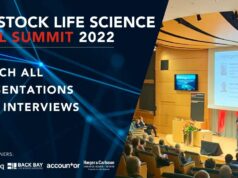
Sprint Bioscience maintains focus on developing the portfolio
With the activities for 2022 in full swing, Sprint Bioscience publishes the report for the year’s first quarter where we can note a continued focus on developing the programs in the portfolio. The company will begin presenting the latest internal program in the portfolio to potential partners and a scientific council has been appointed to support the future development. BioStock contacted the company’s CEO Erik Kinnman to get his thoughts on the first quarter.
Huddinge-based Sprint Bioscience specialises in developing preclinical drug programs within cancer treatment, with the goal of reaching early out-licensing of the projects. So far, three out-licensing agreements have been signed. Together these three agreements have a total potential value of about 747 MUSD plus royalties, and the company has recently geared up to be able to add even more deals to that list.
At the end of last year, Sprint Bioscience announced plans to expand the organisation and right now the company is in full swing expanding laboratory capacity to enable a scale-up of operations.
Some signs of the higher activity can be found in the income statement, where the company reported an operating result of approximately -14.4 MSEK in Q1 compared to -13.0 for the corresponding period in 2021.
Great interest in Vps34 at AACR
Vps34, which last year was out-licensed to American Deciphera Pharmaceuticals, has, according to Sprint Bioscience, developed well in the hands of the new owner. New and previously unpublished results were presented at the American Association for Cancer Research (AACR) conference – which are said to have attracted interest among visitors and strengthened the further development of the program.
Within PETRA01 and NASH, development at the two license takers is also progressing according to plan.
Great interest in the internal projects
Taking a closer look at the programs that have yet to be licensed, there were recently interesting news regarding the VADA program. Two independent research groups have published new findings regarding the target protein VRK1. Among other things the researchers found that the protein may have a role to play in glioblastoma and neuroblastoma. This provides further support for the importance of the target protein in cancer and for the commercial potential of the program. The company states that the next important development step in the program is a planned proof-of-concept study.
At the same time, the company notes that there continues to be a great deal of interest in the program from potential licensees.
The company has also noted serious interest in the DISA program, where Sprint Bioscience plans to conduct an experimental proof-of-concept study next year to confirm that the selected molecules in the program are working properly.
Marketing of NIMA started
The perhaps biggest news this quarter, however, was the unveiling of the target protein in the NIMA program, which is the company’s latest addition to the family. Sprint Bioscience believes that the program is now ready to be taken to market and recently chose to announce that the protein that is being targeted is Nicotinamide N-methyl transferase (NNMT). Inhibiting NNMT has been shown to have an effect on the growth of new cancer cells and has also been shown to increase the immune response in the cancerous tumour. The plan is to officially launch the program at the BIO International partnering meeting, which takes place in mid-June.
Appoints scientific advisory board
In connection with the Q1 report, Sprint Bioscience also took the opportunity to announce that it has appointed a scientific advisory board, which will support the continued development. The council consists of Professor Gunilla Enblad, Professor Robert J DeVita and Professor Lewis C. Cantley, all leading experts in oncology.
In addition to her oncology professorship, Gunilla Enblad is chief physician at Uppsala University Hospital and is, among other things, a member of the Royal Swedish Society of Sciences in Uppsala and a member of the board of the Swedish Cancer Society.
Robert J DeVita has, among other things, been Director of Medicinal Chemistry at Merck Research Laboratories, where he was responsible for developing drug candidates for further clinical development. He has also been Vice President, Chemistry at Agios, a company that, like Sprint Bioscience, focuses on early drug development in oncology.
The final member, Lewis C. Cantley, is a professor at the Dana Farber Cancer Institute and is internationally recognised for his pioneering discoveries in cancer metabolism – including discovering and studying the enzyme PI-3 kinase, which plays an important role in cancer and diabetes, among other things. In addition to a long and successful academic career, he has also started several biotech companies focusing on cancer, including Agios Pharmaceuticals, Petra Pharma and Volastra Therapeutics.
CEO comments
Having put the first quarter behind them, Sprint Bioscience now looks ahead to the rest of the year, with the launch of a new program right around the corner and new scientific advisory board. BioStock took the opportunity to contact CEO Erik Kinnman, to get his views on the latest developments in the company.

How would you sum up the first quarter of 2022?
– Intense and successful. The internal programs are advancing, and we now have three programs that we can discuss with potential partners. The early development of programs is also going well, and we expect to be able to add another program to our development portfolio later this year. At the same time, our licensees are taking the out-licensed programs further towards future milestones and we look forward to being able to tell you more about them.
Have you been affected by the war in Ukraine, and if so, how?
– Not directly as we do not have operations in Ukraine. However, we have temporarily had to change supplier of certain chemicals as the company in question has its operations in Kiev. The supplier is now back up and running. Indirectly, of course, we are all affected in different ways.
You announced in December that you were looking to expand operations. How is this work progressing?
– We first need to make sure that we expand our lab facilities, and this is going according to plan. An expansion of the organisation is the next step in the plan.
When do you think this expansion will be completed and be able to keep the pace of development that you are striving for?
– We will be fully finished with the expansion in about 2 – 3 years, but we gradually expect that the expanded capacity will lead to a higher output, both in terms of quantity and quality.
In the update on the DISA program, you state that you will be conducting a proof-of-concept study. Why will this study not start until next year?
– There are some additional development steps to make sure that the molecules have the desired effects in cell-based models and that they behave as expected in vivo before starting a more extensive experimental proof-of-concept study.
You just announced your scientific advisory board. How will that influence the development going forward?
– We now have an external group of recognised and leading experts in our field with good knowledge of our existing portfolio and also of future programs. This gives us the opportunity to critically evaluate and validate the possible patient benefit, the science behind our programs, as well as existing and upcoming documentation. Overall, it will further raise the quality of our programs.
The content of BioStock’s news and analyses is independent but the work of BioStock is to a certain degree financed by life science companies. The above article concerns a company from which BioStock has received financing.


